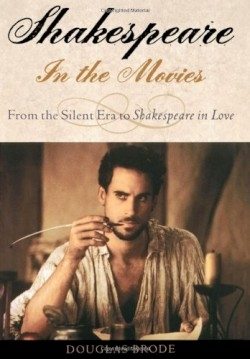Shakespeare in the Movies
From the Silent Era to Shakespeare in Love
A magazine ad campaign once ran the following: “Bill Shakespeare, screenwriter. Discuss.”
If that is the question, then Shakespeare in the Movies is the answer. An informed, lively commentary on all films using Shakespeare’s plays as their original, or indirect, source, Shakespeare’s posthumous box office career is narrated from the earliest “flickers” to that Oscar-winning biopic of “Romeo and Ethel” renamed Shakespeare in Love. Author of some eighteen books on film culture and a Professor of Film at Syracuse University, Brode is succinctly mindful of the telling visual detail, yet expansively shrewd in framing the films’ critical reception. (He avoids any television work, a pity, given that the BBC’s stellar casting of all the plays received wide American broadcast.)
His strength is in parsing the parts to the whole, how performances and direction add up to a finished film. His observations on Kenneth Branaugh’s Hamlet, or Branaugh’s Iago to Laurence Fishburne’s technically outclassed Othello are particularly good. He’s less persuasive on theatrical acting technique—it’s not true, as he flatly states, that Shakespearean soliloquies are exactly realized in voice-overs. Quite the contrary: a soliloquy speaks to the audience, nakedly breaking the fourth-wall convention, making the audience collude with the actor (as Branaugh did to the camera as Iago). A disembodied voice, even Olivier’s, reading aloud to the audience distances it, and as screenwriting, is often a tell-take sign of wanting to preserve the literary voice without dramatizing it.
What is absent, however, is any sort of overview that explains Shakespeare’s fascination. The book seems less than its parts, and its conclusion, shoehorning a list of coming feature attractions, ends with a kind of fan’s notes breathlessness. Saying that Shakespeare’s plays provide enough ambiguity for varied interpretations is too tame. If Shakespeare pruned his own exuberant pentameter to performance, cutting wildly in rehearsal, like a director who deliberately overshoots in order to find his film in the editing room, as Brode surmises, what exactly makes the plays still so playable? What primitive urge is it to hear great language greatly spoken?
In his breezy introduction to “Will” (as he familiarly calls him), he asks the screenwriter question again. Is it, that like Leonardo’s flying machine that languished on paper centuries before it was translated to life, Shakespeare’s fecund imagination so anticipated cinema’s quick-cut scene fluidity that had he a video-camera, he’d never have been imprisoned in iambic pentameter? If he’d had a camera, would he have still been a poet?
Reviewed by
Leeta Taylor
Disclosure: This article is not an endorsement, but a review. The publisher of this book provided free copies of the book to have their book reviewed by a professional reviewer. No fee was paid by the publisher for this review. Foreword Reviews only recommends books that we love. Foreword Magazine, Inc. is disclosing this in accordance with the Federal Trade Commission’s 16 CFR, Part 255.

